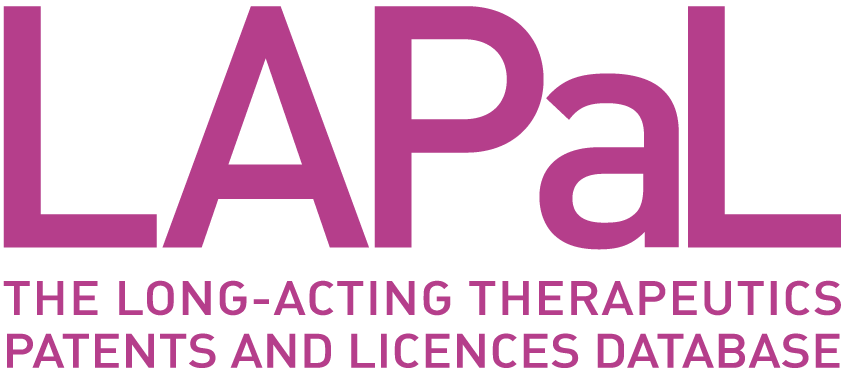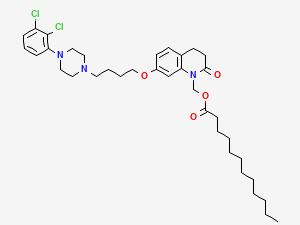Clinical trials
ALK9072-A401
Identifier
NCT02634320
Link
https://clinicaltrials.gov/study/NCT02634320
Phase
Marketed
Status
Completed
Sponsor
Alkermes, Inc.
More details
This study will evaluate the safety and tolerability of aripiprazole lauroxil (also known as ARISTADA, ALKS 9070).
Purpose
A Study of Aripiprazole Lauroxil (Also Known as ARISTADA TM) in Subjects With Schizophrenia
Interventions
Intervention 1
Aripiprazole Lauroxil
Countries
United States of America
Sites / Institutions
Not provided
Trials dates
Anticipated Start Date
Not provided
Actual Start Date
2015-12-01 00:00:00
Anticipated Date of Last Follow-up
2018-11-09 00:00:00
Estimated Primary Completion Date
Not provided
Estimated Completion Date
Not provided
Actual Primary Completion Date
2017-07-11 00:00:00
Actual Completion Date
2017-07-11 00:00:00
Studied populations
Age Cohort
Genders
Accepts pregnant individuals
Unspecified
Accepts lactating individuals
Unspecified
Accepts healthy individuals
No
Comments about the studied
populations
Inclusion Criteria:
* Has demonstrated tolerability to test doses of oral aripiprazole during screening; OR has a history of tolerated use of aripiprazole
* Has a diagnosis of schizophrenia
* Is clinically stable
* Has received at least 3 doses of risperidone long acting injection (Risperdal Consta) or paliperidone palmitate (Invega Sustenna) prior to screening.
* Has no antipsychotic medication regimen change for 4 weeks prior to Day 1
* Agreed to abide by the contraceptive requirements o the protocol
* Resides in a stable living situation
* Additional criteria may apply
Exclusion Criteria:
* Is currently pregnant or breastfeeding, or is planning to become pregnant during the study
* Has received Invega Trinza, aripiprazole lauroxil, or IM depot aripiprazole within 6 months of screenin
Health status
Not provided
Study type
Interventional (clinical trial)
Enrollment
51
Allocation
Not provided
Intervention model
Single group assignment
Intervention
model description
Not provided
Masking
Open label
Masking description
Not provided
Frequency of administration
Weekly
Monthly
Every 6 months
Studied LA-formulation(s)
Injectable
Studied route(s) of administration
Intramuscular
Use case
Treatment
Key resources
Not provided
ALK9072-A105
Identifier
NCT02320032
Link
https://clinicaltrials.gov/study/NCT02320032
Phase
Phase I
Status
Completed
Sponsor
Alkermes, Inc.
More details
This study will evaluate the safety, tolerability, and pharmacokinetics (PK) of various doses and dosing intervals of aripiprazole lauroxil.
Purpose
An Open-Label Study of Aripiprazole Lauroxil in Subjects With Stable Schizophrenia
Interventions
Intervention 1
Aripiprazole Lauroxil
Countries
United States of America
Sites / Institutions
Not provided
Trials dates
Anticipated Start Date
Not provided
Actual Start Date
2014-12-01 00:00:00
Anticipated Date of Last Follow-up
2018-08-28 00:00:00
Estimated Primary Completion Date
Not provided
Estimated Completion Date
Not provided
Actual Primary Completion Date
2016-04-01 00:00:00
Actual Completion Date
2016-04-01 00:00:00
Studied populations
Age Cohort
Genders
Accepts pregnant individuals
Unspecified
Accepts lactating individuals
Unspecified
Accepts healthy individuals
No
Comments about the studied
populations
Inclusion Criteria:
* Has stable schizophrenia or schizoaffective disorder
* Has demonstrated ability to tolerate aripiprazole
* Has been on a stable antipsychotic medication regimen without any changes for at least 2 months prior to screening
* Has a body mass index (BMI) of 18.0 to 35.0 kg/m2, inclusive
* Additional criteria may apply
Exclusion Criteria:
* Is pregnant, breastfeeding, or is planning to become pregnant during the study period
* Has received aripiprazole lauroxil or IM depot aripiprazole within 6 months, or other long-acting, injectable antipsychotic medication within 3 months
* Is a danger to himself/herself at screening or upon admission
* Has a history of or positive test result for human immunodeficiency virus (HIV), hepatitis B, or hepatitis C
* Has a positive urine
Health status
Not provided
Study type
Interventional (clinical trial)
Enrollment
140
Allocation
Randomized
Intervention model
Parallel Assignment
Intervention
model description
Not provided
Masking
Open label
Masking description
Not provided
Frequency of administration
Monthly
Every 2 months
Studied LA-formulation(s)
Injectable
Studied route(s) of administration
Intramuscular
Use case
Treatment
Key resources
Not provided
ALK9072-A106
Identifier
NCT02636842
Link
https://clinicaltrials.gov/study/NCT02636842
Phase
Phase I
Status
Completed
Sponsor
Alkermes, Inc.
More details
The study will determine the safety, tolerability, and pharmacokinetics of aripiprazole lauroxil in adults with schizophrenia or schizoaffective disorder.
Purpose
A Study of Aripiprazole Lauroxil in Subjects With Schizophrenia or Schizoaffective Disorder
Interventions
Intervention 1
Aripiprazole Lauroxil
Countries
United States of America
Sites / Institutions
Not provided
Trials dates
Anticipated Start Date
Not provided
Actual Start Date
2015-12-01 00:00:00
Anticipated Date of Last Follow-up
2016-07-13 00:00:00
Estimated Primary Completion Date
Not provided
Estimated Completion Date
Not provided
Actual Primary Completion Date
2016-06-01 00:00:00
Actual Completion Date
2016-06-01 00:00:00
Studied populations
Age Cohort
Genders
Accepts pregnant individuals
Unspecified
Accepts lactating individuals
Unspecified
Accepts healthy individuals
No
Comments about the studied
populations
Inclusion Criteria:
* Has a diagnosis of chronic schizophrenia or schizoaffective disorder
* Has demonstrated ability to tolerate aripiprazole
* Has been on a stable antipsychotic medication regimen without any changes for at least 2 months prior to screening
* Has a body mass index (BMI) of 18.0 to 40.0 kg/m2, inclusive
* Additional criteria may apply
Exclusion Criteria:
* Is pregnant, is planning to become pregnant, or is currently breastfeeding
* Has received aripiprazole lauroxil or IM depot aripiprazole within 6 months, or other long-acting, injectable antipsychotic medication within 3 months or currently treated with clozapine
* Is a danger to himself/herself at screening or upon admission
* Has a history of or positive test result for human immunodeficiency virus (HIV), hepatitis
Health status
Not provided
Study type
Interventional (clinical trial)
Enrollment
47
Allocation
Not provided
Intervention model
Single group assignment
Intervention
model description
Not provided
Masking
Open label
Masking description
Not provided
Frequency of administration
Once
Studied LA-formulation(s)
Injectable
Studied route(s) of administration
Intramuscular
Use case
Treatment
Key resources
Not provided
ALK9072-A306
Identifier
NCT03345979
Link
https://clinicaltrials.gov/study/NCT03345979
Phase
Phase III
Status
Completed
Sponsor
Alkermes, Inc.
More details
This study will evaluate the efficacy of initiating treatment of schizophrenia with ARISTADA INITIO plus 30 mg oral aripiprazole followed by a 2-month dose of AL.
Purpose
A Study of Aripiprazole Lauroxil or Paliperidone Palmitate for the Treatment of Schizophrenia
Interventions
Intervention 1
Aripiprazole Lauroxil
Intervention 3
Paliperidone Palmitate
Countries
United States of America
Sites / Institutions
Not provided
Trials dates
Anticipated Start Date
Not provided
Actual Start Date
2017-11-15 00:00:00
Anticipated Date of Last Follow-up
2020-07-29 00:00:00
Estimated Primary Completion Date
Not provided
Estimated Completion Date
Not provided
Actual Primary Completion Date
2019-03-12 00:00:00
Actual Completion Date
2019-03-12 00:00:00
Studied populations
Age Cohort
Genders
Accepts pregnant individuals
Unspecified
Accepts lactating individuals
Unspecified
Accepts healthy individuals
No
Comments about the studied
populations
Inclusion Criteria:
* Has a diagnosis of schizophrenia
* Requires acute treatment for symptoms of schizophrenia
* Willing and able to be confined to an inpatient study unit for up to 3-4 weeks
* Has experienced at least one previous hospitalization for schizophrenia
* Has been able to achieve outpatient status for more than 3 months in the past year
* Has a body mass index (BMI) between 18.0 and 40.0 kg/m\^2
* Resides in a stable living situation when not hospitalized
* Has an identified reliable caregiver (for example, family member)
* Additional criteria may apply
Exclusion Criteria:
* Poses a current suicide risk
* Pregnant, planning to become pregnant, or breastfeeding
* Initiated first antipsychotic treatment within the past 12 months
* Has received a long-acting injectable antipsy
Health status
Not provided
Other health status: Schizophrenia
Study type
Interventional (clinical trial)
Enrollment
200
Allocation
Randomized
Intervention model
Parallel Assignment
Intervention
model description
Not provided
Masking
Quadruple-blind masking
Masking description
Not provided
Frequency of administration
Once
Studied LA-formulation(s)
Injectable
Studied route(s) of administration
Intramuscular
Use case
Treatment
Key resources
Not provided
APPRAISE
Identifier
NCT04203056
Link
https://clinicaltrials.gov/study/NCT04203056
Phase
Marketed
Status
Terminated
Sponsor
University of California, Los Angeles
More details
This 12-month study will evaluate the efficacy of aripiprazole lauroxil compared to oral aripiprazole in preventing the re-emergence of psychotic symptoms in patients with a recent onset of schizophrenia.
Purpose
Aripiprazole Lauroxil for Preventing Psychotic Relapse After an Initial Schizophrenia Episode
Interventions
Intervention 1
Aripiprazole Lauroxil
Intervention 3
ARI-ORAL
Intervention 5
AL-NCD
Countries
United States of America
Sites / Institutions
Not provided
Trials dates
Anticipated Start Date
Not provided
Actual Start Date
2019-12-16 00:00:00
Anticipated Date of Last Follow-up
2023-11-04 00:00:00
Estimated Primary Completion Date
Not provided
Estimated Completion Date
Not provided
Actual Primary Completion Date
2022-10-01 00:00:00
Actual Completion Date
2022-10-01 00:00:00
Studied populations
Age Cohort
Genders
Accepts pregnant individuals
Unspecified
Accepts lactating individuals
Unspecified
Accepts healthy individuals
No
Comments about the studied
populations
Inclusion Criteria:
1. Is between 18 and 45 years of age, inclusive, at Screening.
2. Has a diagnosis of schizophreniform disorder, schizophrenia, or schizoaffective disorder, depressed type.
3. Has a first episode of a psychotic illness that occurred within the 24 months before entry.
4. Fluency (oral and written) in the English language.
5. Exhibits tolerability to ARI ORAL during the Stabilization period.
6. Resides within commuting distance of the UCLA Aftercare Research Program in a stable living situation where the patient can be located.
7. Agrees to abide by the contraceptive requirements of the protocol.
8. Additional criteria may apply
Exclusion Criteria:
1. Evidence of a known neurological disorder (e.g., epilepsy) or significant head injury.
2. Premorbid IQ less than 70.
3.
Health status
Not provided
Study type
Interventional (clinical trial)
Enrollment
15
Allocation
Randomized
Intervention model
Parallel Assignment
Intervention
model description
Not provided
Masking
Open label
Masking description
Not provided
Frequency of administration
Monthly
Every 2 months
Other/Variable/Unknown
:
"Every 6 weeks
"
Studied LA-formulation(s)
Injectable
Studied route(s) of administration
Intramuscular
Use case
Treatment
Key resources
Not provided
NCT05662306
Identifier
NCT05662306
Link
https://clinicaltrials.gov/study/NCT05662306
Phase
Marketed
Status
Terminated
Sponsor
University of Miami
More details
The purpose of this study is to examine the role of clinical stability in functional recovery. in first episode schizophrenia.
Purpose
C-Cog in Early Course Schizophrenia Study
Interventions
Intervention 1
Aripiprazole Lauroxil
Intervention 3
Computerized cognitive and functional skills training
Countries
United States of America
Sites / Institutions
Not provided
Trials dates
Anticipated Start Date
Not provided
Actual Start Date
2024-01-23 00:00:00
Anticipated Date of Last Follow-up
2025-03-14 00:00:00
Estimated Primary Completion Date
Not provided
Estimated Completion Date
Not provided
Actual Primary Completion Date
2025-03-03 00:00:00
Actual Completion Date
2025-03-03 00:00:00
Studied populations
Age Cohort
Genders
Accepts pregnant individuals
Unspecified
Accepts lactating individuals
Unspecified
Accepts healthy individuals
No
Comments about the studied
populations
Inclusion Criteria:
1. Adults
2. Diagnosis of schizophrenia
3. Current Hospitalization or outpatient relapse
4. Fewer than four previous admissions
5. Willing to accept long-acting injectable treatment and participate in rehabilitation
Exclusion Criteria:
1. Primary diagnosis other than schizophrenia
2. Prior Long Acting Injectable treatment
3. Current Suicide Risk
4. Hypersensitivity to Aripiprazole
5. Pregnancy
6. Positive illicit drug screen other than cannabis (rescreening allowed in 4 weeks for drug positive cases)
7. Unable to give personal informed consent
8. History of treatment resistance as evidenced by clozapine treatment
9. Unable to stop treatment with medications that are strong Cytochrome (CYP) 2D6 or CYP 3A4 inhibitors and or strong CYP3A4 inducers (2.3, 7.1) for at 14 d
Health status
Not provided
Study type
Interventional (clinical trial)
Enrollment
60
Allocation
Not provided
Intervention model
Single group assignment
Intervention
model description
Not provided
Masking
Open label
Masking description
Not provided
Frequency of administration
Every 2 months
Studied LA-formulation(s)
Injectable
Studied route(s) of administration
Intramuscular
Use case
Treatment
Key resources
Not provided
ALK9072-003
Identifier
NCT01469039
Link
https://clinicaltrials.gov/study/NCT01469039
Phase
Phase III
Status
Completed
Sponsor
Alkermes, Inc.
More details
The study will determine the efficacy of ALKS 9072 (also known as aripiprazole lauroxil or ALKS 9070) for the treatment of schizophrenia in subjects experiencing an acute exacerbation.
Purpose
A Study to Evaluate the Efficacy and Safety of ALKS 9072 (Also Known as Aripiprazole Lauroxil, ALKS 9070, or ARISTADA) in Subjects With Schizophrenia
Interventions
Intervention 1
ALKS 9072
Intervention 3
Placebo
Countries
Bulgaria
Malaysia
Philippines
Romania
Russian Federation
Ukraine
United States of America
Sites / Institutions
Not provided
Trials dates
Anticipated Start Date
Not provided
Actual Start Date
2011-12-01 00:00:00
Anticipated Date of Last Follow-up
2019-01-14 00:00:00
Estimated Primary Completion Date
Not provided
Estimated Completion Date
Not provided
Actual Primary Completion Date
2014-01-01 00:00:00
Actual Completion Date
2014-03-01 00:00:00
Studied populations
Age Cohort
Genders
Accepts pregnant individuals
Unspecified
Accepts lactating individuals
Unspecified
Accepts healthy individuals
No
Comments about the studied
populations
Inclusion Criteria:
* Diagnosis of schizophrenia according to DSM-IV-TR criteria
* Has been able to achieve outpatient status for more than 3 months in the past year
* Body mass index (BMI) of 18.5 to 40.0 kg/m2 (inclusive)
* Resides in a stable living situation
* Willing and able to be confined to an inpatient study unit for 2 weeks or longer
Exclusion Criteria:
* History of poor or inadequate clinical response to treatment with aripiprazole
* History of treatment resistance
* Known or suspected intolerance of, allergy, or hypersensitivity to aripiprazole, its ingredients, other antipsychotic agent, or INTRALIPID (including peanuts, soy, egg, or glycerol)
* Diagnosis of current substance dependence (including alcohol)
* Pregnant, lactating, or breastfeeding
* Receipt of any antipsychot
Health status
Not provided
Study type
Interventional (clinical trial)
Enrollment
623
Allocation
Randomized
Intervention model
Parallel Assignment
Intervention
model description
Not provided
Masking
Quadruple-blind masking
Masking description
Not provided
Frequency of administration
Monthly
Studied LA-formulation(s)
Injectable
Studied route(s) of administration
Intramuscular
Use case
Treatment
Key resources
Not provided
2008P-001861
Identifier
NCT01246765
Link
https://clinicaltrials.gov/study/NCT01246765
Phase
Marketed
Status
Recruiting
Sponsor
Massachusetts General Hospital
More details
The National Pregnancy Registry for Psychiatric Medications is dedicated to evaluating the safety of psychiatric medications such as antidepressants, ADHD medications, sedative hypnotics, and atypical antipsychotics that many people take during pregnancy to treat a wide range of mood, anxiety, executive function, or psychiatric disorders. The goal of this Registry is to gather information on the safety of these medications during pregnancy, as current data is limited.
Purpose
National Pregnancy Registry for Psychiatric Medications
Interventions
Intervention 1
Aripiprazole Lauroxil
Countries
United States of America
Sites / Institutions
Not provided
Trials dates
Anticipated Start Date
Not provided
Actual Start Date
2008-11-01 00:00:00
Anticipated Date of Last Follow-up
2023-11-08 00:00:00
Estimated Primary Completion Date
2033-12-01 00:00:00
Estimated Completion Date
2033-12-01 00:00:00
Actual Primary Completion Date
Not provided
Actual Completion Date
Not provided
Studied populations
Age Cohort
Unspecified
Genders
Unspecified
Accepts pregnant individuals
Unspecified
Accepts lactating individuals
Unspecified
Accepts healthy individuals
Unspecified
Comments about the studied
populations
Not provided
Health status
Not provided
Study type
Not provided
Enrollment
5000
Allocation
Not provided
Intervention model
Not provided
Intervention
model description
Not provided
Masking
Not provided
Masking description
Not provided
Frequency of administration
Other/Variable/Unknown
Studied LA-formulation(s)
Injectable
Studied route(s) of administration
Topical (Other)
Use case
Unspecified
Key resources
Not provided
ALKS 9072-A403N
Identifier
NCT03919994
Link
https://clinicaltrials.gov/study/NCT03919994
Phase
Marketed
Status
Completed
Sponsor
Alkermes, Inc.
More details
The objectives of this study are to describe characteristics, treatment patterns, and outcomes of patients with schizophrenia newly initiated on 1 of 4 FDA-approved atypical Long Acting Injectable (LAI) antipsychotics (ABILIFY MAINTENA®, ARISTADA®, INVEGA SUSTENNA® or RISPERDAL CONSTA®)
Purpose
Observational Study of Long Acting Injectable Medications (LAIs) in Schizophrenia (OASIS)
Interventions
Intervention 1
Aripiprazole Lauroxil
Countries
United States of America
Sites / Institutions
Not provided
Trials dates
Anticipated Start Date
Not provided
Actual Start Date
2019-03-28 00:00:00
Anticipated Date of Last Follow-up
2023-02-01 00:00:00
Estimated Primary Completion Date
Not provided
Estimated Completion Date
Not provided
Actual Primary Completion Date
2023-01-04 00:00:00
Actual Completion Date
2023-01-04 00:00:00
Studied populations
Age Cohort
Unspecified
Genders
Unspecified
Accepts pregnant individuals
Unspecified
Accepts lactating individuals
Unspecified
Accepts healthy individuals
Unspecified
Comments about the studied
populations
Not provided
Health status
Not provided
Study type
Not provided
Enrollment
338
Allocation
Not provided
Intervention model
Not provided
Intervention
model description
Not provided
Masking
Not provided
Masking description
Not provided
Frequency of administration
Other/Variable/Unknown
Studied LA-formulation(s)
Injectable
Studied route(s) of administration
Intramuscular
Use case
Treatment
Key resources
Not provided
Supporting material
Publications
Efficacy and Safety of a 2-Month Formulation of Aripiprazole Lauroxil With 1-Day Initiation in Patients Hospitalized for Acute Schizophrenia Transitioned to Outpatient Care: Phase 3, Randomized, Double-Blind, Active-Control ALPINE Study.
Weiden, P. J., Claxton, A., Kunovac, J., Walling, D. P., Du, Y., Yao, B., Yagoda, S., Bidollari, I., Keane, E., & Cash, E. (2020). The Journal of clinical psychiatry, 81(3), 19m13207.
https://doi.org/10.4088/JCP.19m13207
Objective: Evaluate efficacy and safety of a 2-month formulation of aripiprazole lauroxil (AL) with 1-day initiation during hospitalization for acute exacerbation of schizophrenia followed by transition to outpatient care.
Methods: The phase 3b double-blind Aripiprazole Lauroxil and Paliperidone palmitate: INitiation Effectiveness (ALPINE) study was conducted from November 2017 to March 2019. Adults with acute schizophrenia according to DSM-5 criteria were randomized (1:1) to AL (AL NanoCrystal Dispersion + oral aripiprazole 30 mg, day 1; AL 1,064 mg, day 8 and every 8 weeks [q8wk]) or paliperidone palmitate (PP 234 mg, day 1; PP 156 mg, day 8 and then q4wk) for 25 weeks. Patients remained hospitalized ≥ 2 weeks after randomization per protocol. Primary endpoint was within-group change in Positive and Negative Syndrome Scale total score (PANSST) from baseline to week 4. Secondary analyses included within- and between-group changes from baseline at various time points. Adverse events (AEs) and laboratory data were monitored.
Results: A total of 200 patients were randomized (AL, n = 99; PP, n = 101); 56.6% and 42.6%, respectively, completed the study. For AL, the mean baseline PANSST was 94.1; scores were significantly reduced from baseline at week 4 (-17.4; P < .001) and were also reduced at weeks 9 (-19.8) and 25 (-23.3). With PP, PANSST also improved significantly from baseline (94.6) at week 4 (-20.1; P < .001) and also improved at weeks 9 (-22.5) and 25 (-21.7). The 3 most common AEs over 25 weeks in the AL group were injection site pain (17.2%), increased weight (9.1%), and akathisia (9.1%). The same AEs were the most common in the PP group (injection site pain [24.8%], increased weight [16.8%], and akathisia [10.9%]).
Conclusions: AL and PP were efficacious and well-tolerated for initiating treatment of schizophrenia in the hospital and continuing outpatient treatment.
Best Practices for Aripiprazole Lauroxil Administration: From Formulation Development to Injection Technique.
Farwick, S., Hickey, M. B., Jacobs, G., Faldu, S. P., Vandiver, J., & Weiden, P. J. (2019).
Journal of psychiatric practice, 25(2), 82–90. https://doi.org/10.1097/PRA.0000000000000376
Long-acting injectable (LAI) antipsychotics are an important treatment option for patients with schizophrenia. Advances and variability in formulation technology have provided several LAI antipsychotic treatment options for schizophrenia, with a wide range of doses and dose intervals. However, clinical reviews of LAIs have not focused on formulation development despite its clinical relevance to injection safety and technique. This article reviews the relationship between formulation technology and clinical practices for LAIs, with a focus on aripiprazole lauroxil, a long-acting atypical antipsychotic indicated for the treatment of schizophrenia. The formulation developed for aripiprazole lauroxil is an aqueous-based suspension suitable for use as a prefilled syringe that, after injection, will release aripiprazole slowly into the plasma. The clinical relationship between the aripiprazole lauroxil formulation and proper injection techniques is explained, including why tapping and shaking the syringe to resuspend the drug particles and rapid injection speed are key steps for best injection practices for this formulation.
Aripiprazole Lauroxil Compared with Paliperidone Palmitate in Patients with Schizophrenia: An Indirect Treatment Comparison
Cameron, C., Zummo, J., Desai, D. N., Drake, C., Hutton, B., Kotb, A., & Weiden, P. J. (2017).
Value in health : the journal of the International Society for Pharmacoeconomics and Outcomes Research, 20(7), 876–885. https://doi.org/10.1016/j.jval.2017.03.010
Background: Aripiprazole lauroxil (AL) is a long-acting injectable atypical antipsychotic recently approved for treatment of schizophrenia on the basis of a large-scale trial of two doses of AL versus placebo. There are no direct-comparison studies with paliperidone palmitate (PP; long-acting antipsychotic used most often in acute settings) for the acute psychotic episode.
Objectives: To indirectly compare efficacy and safety of the pivotal AL study with all PP studies meeting indirect comparison criteria.
Methods: Systematic searches of MEDLINE, Embase, Cochrane CENTRAL, PsycINFO, ClinicalTrials.gov, International Clinical Trials Registry Platform, and gray literature were performed to identify randomized controlled trials of PP with similar designs to the AL trial. Bayesian network meta-analysis compared treatments with respect to symptom response and tolerability issues including weight gain, akathisia, parkinsonism, and likelihood of treatment-emergent adverse events.
Results: Three appropriate PP studies were identified for indirect comparison. Both doses of AL (441 mg and 882 mg monthly) were used and compared with two efficacious doses of PP (156 mg and 234 mg monthly). All four active-treatment conditions were associated with comparable reductions in acute symptoms (Positive and Negative Syndrome Scale) versus placebo and were of similar magnitude (range of mean difference -8.12 to -12.01, with overlapping 95% credible intervals). Between-group comparisons of active-treatment arms were associated with summary estimates of magnitude near 0. No clinically meaningful differences in selected safety or tolerability parameter incidence were found between active treatments.
Conclusions: These results suggest that both AL and PP are effective for treatment of adults experiencing acute exacerbation of schizophrenia.
Keywords: aripiprazole lauroxil; indirect comparison; paliperidone palmitate; schizophrenia.
Additional documents
No documents were uploaded
Useful links
There are no additional links







